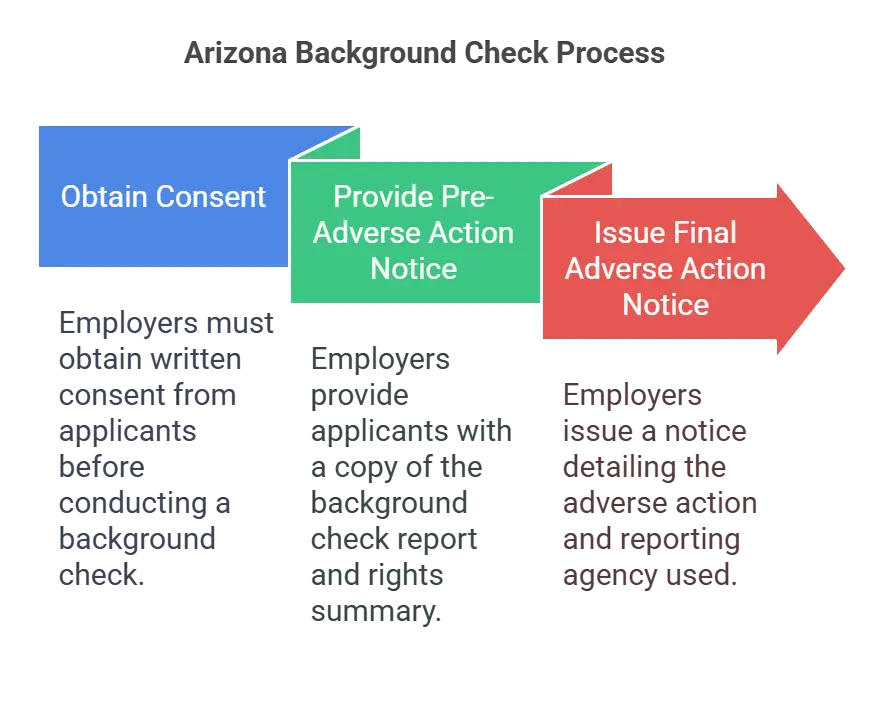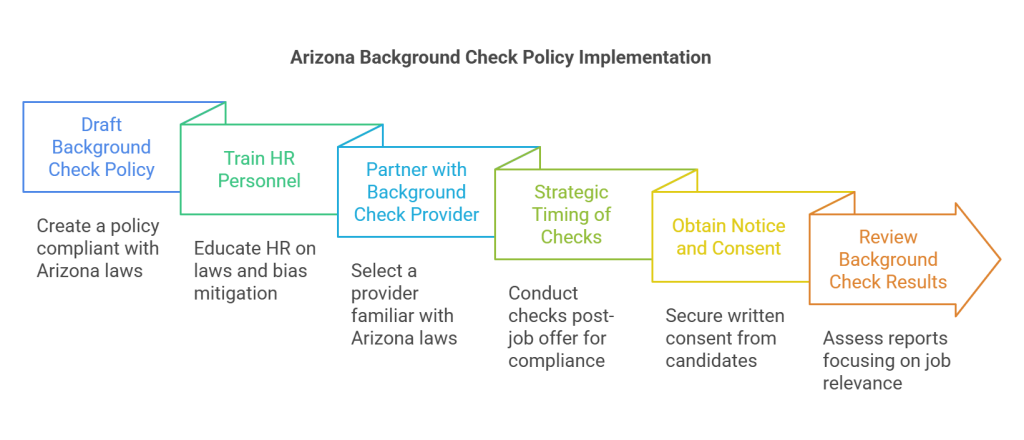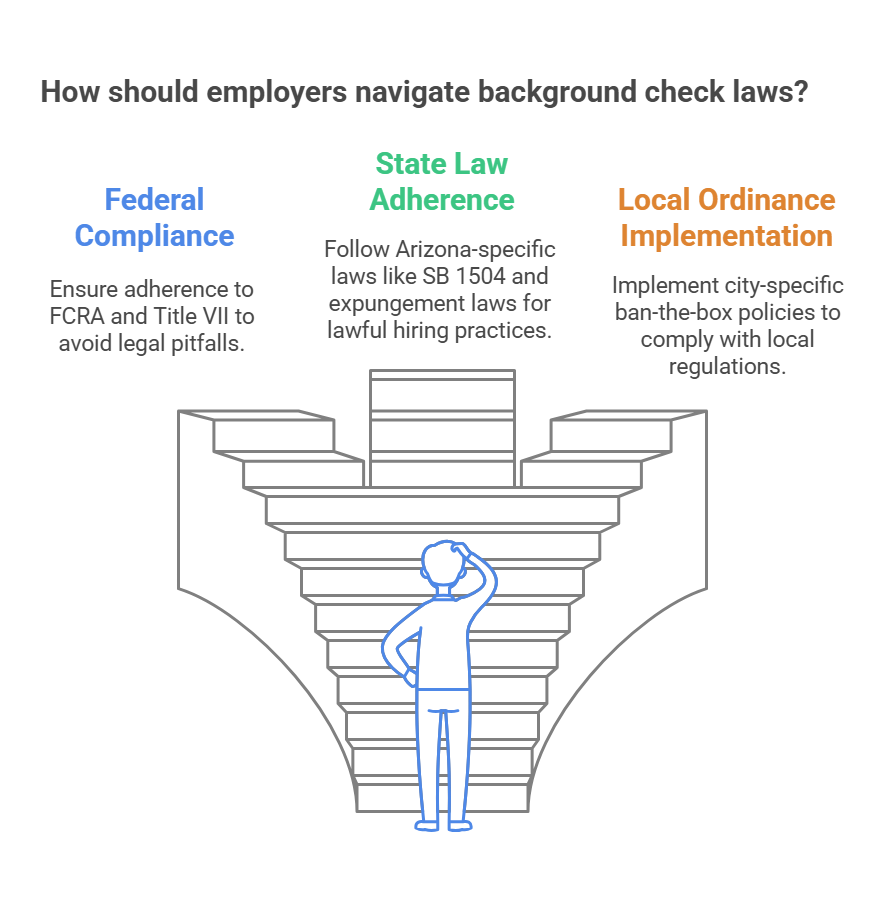The landscape of background checks in Arizona is evolving rapidly. Recent legal changes, such as the 2020 Senate Bill 1504 and the expungement of marijuana convictions, have reshaped how employers approach the screening process. At GCheck, we've been at the forefront of these changes, conducting extensive research to help businesses stay compliant and competitive.
This comprehensive guide serves as a practical resource for Arizona employers, offering insights into the strategic benefits of background checks, navigating complex compliance issues, and implementing best practices that go beyond mere legal requirements.
Key Takeaways
- Consent Requirement: Arizona background check laws necessitate obtaining written consent from candidates before conducting checks.
- Adverse Action Process: Employers must follow specific procedures based on background check results when taking adverse actions.
- Timing of Checks: Background checks should be conducted at an appropriate stage in the hiring process, usually after a conditional job offer.
- Prohibited Queries: Arizona law restricts inquiries into certain offenses and older criminal convictions to ensure fair hiring practices.
- Industry-Specific Requirements: Various industries like healthcare and transportation have additional stringent background check requirements.
Introduction
In today's highly competitive job market, ensuring your workplace is safe and productive is paramount. One essential tool in achieving this is the background check. Background checks help employers verify candidates' history and qualifications, ensuring they make well-informed hiring decisions. This guide focuses on Arizona background check laws, shedding light on statewide regulations and how they interact with federal laws.
Understanding the legal landscape in Arizona for background checks is not just for compliance; it's about fostering a fair and transparent hiring process. By the end of this article, businesses will have a comprehensive understanding of what Arizona law requires regarding background checks, how to stay compliant, and best practices to implement in their hiring processes.
EXPERT INSIGHT: Background checks are more than just for compliance. As an HR professional, to me, it is a puzzle piece in an organization that is a pivotal in fostering trust and integrity. Looking closely at Arizona's evolving laws, employers have a unique opportunity to lead with fairness and inclusivity. It’s not just about screening. It’s about aligning practices with values that prioritize equity, opportunity, and respect. - Charm Paz, CHRP
Understanding Arizona Background Check Laws
Arizona follows both federal and state-specific laws regarding background checks. The state's primary statute governing background checks is the Arizona Revised Statutes (ARS) 41-1750, which outlines requirements for criminal justice agencies to report arrest and disposition information to the Central State Repository.
Additionally, Arizona has implemented a "Ban the Box" law, effective since 2019. This law prohibits employers from inquiring about an applicant's criminal history on initial job applications, aiming to give individuals with criminal records a fairer chance at employment.
The Arizona Employment Protection Act (AEPA)
The Arizona Employment Protection Act (AEPA) is a state law that governs the relationship between employers and employees in Arizona. Enacted in 1996, the AEPA codifies the state's public policy regarding employment relationships and provides certain employee protections1.
Key Provisions of the AEPA
Employment-at-Will: The AEPA reaffirms Arizona's employment-at-will doctrine, which means that the employer or the employee can terminate the employment relationship at any time, with or without cause, unless a written contract specifies otherwise.
Exceptions to Employment-at-Will: While the AEPA upholds the employment-at-will principle, it also recognizes several exceptions where an employer cannot terminate an employee for certain reasons. These exceptions include:
- Breach of Contract
- Violation of Public Policy
- Violation of State Statute
Legal Requirements for Arizona Background Checks

Consent and Disclosure
In Arizona, employers must obtain written consent from job applicants before conducting a background check. This consent should be clear, conspicuous, and separate from other application materials. The disclosure must inform the applicant that a consumer report may be obtained for employment purposes.
Adverse Action Process
When taking adverse action based on background check results, Arizona employers must follow a two-step process:
- Pre-adverse action notice: Provide the applicant with a copy of the background check report and a summary of their rights under the FCRA.
- Final adverse action notice: If proceeding with the adverse action, provide a written notice stating the action taken and information about the consumer reporting agency used.
Arizona Employment Screening Process
Prohibited Queries
Arizona law restricts employers from inquiring about or considering certain types of information in background checks:
- Arrests that did not result in conviction
- Convictions that have been expunged, sealed, or pardoned
- Misdemeanor convictions where no jail sentence can be imposed
- Juvenile records (unless required by law for specific positions)
Arizona Hiring Laws: Industry-Specific Considerations
Healthcare
In addition to standard background checks, healthcare employers in Arizona must comply with the requirements set by the Arizona Health Care Cost Containment System (AHCCCS). This includes:
- Fingerprint clearance cards for certain positions
- Checks against the Office of Inspector General's List of Excluded Individuals/Entities
- Verification of professional licenses and certifications
Education
The education sector in Arizona has specific background check requirements:
- Fingerprint clearance cards are mandatory for all school employees
- Background checks must be conducted through the Arizona Department of Public Safety
- Checks must include both state and federal criminal history records
What Shows Up on an Arizona Background Check
Criminal History Information
In Arizona, background checks typically distinguish between felonies and misdemeanors. Felonies, being more serious offenses, often carry greater weight in hiring decisions. However, it's crucial to understand Arizona's specific disclosure and reporting requirements.
For instance, under Arizona law, certain marijuana-related convictions can now be expunged, and employers must be cautious about how they consider such information in their hiring process.
Employment Verification
When verifying employment history in Arizona, best practices include:
- Contacting previous employers directly
- Verifying dates of employment, job titles, and reasons for leaving
- Being aware of limitations on what previous employers can legally disclose
Education Verification
Arizona employers must be vigilant about diploma mills and fraudulent credentials. When verifying educational background:
- Contact institutions directly through official channels
- Be wary of online-only institutions with questionable accreditation
- Consider using a reputable verification service to ensure accuracy
How to Conduct Background Checks in Arizona: A Step-by-Step Guide

Draft an Effective and Compliant Background Check Policy
Your policy should be tailored to Arizona's specific legal landscape. Consider including language like:
"Our company conducts background checks in compliance with all applicable federal, state, and local laws, including the Fair Credit Reporting Act and Arizona's ban-the-box laws for public employers."
Train Human Resources Personnel
Essential training topics for HR staff include:
- Updates on Arizona's background check laws
- Recognizing and mitigating unconscious bias
- Proper recordkeeping and data security practices
Consider enrolling staff in certification programs offered by organizations like SHRM or ASIS International.
Partner with a Reputable Background Check Provider
When evaluating providers, ask:
- How familiar are you with Arizona's specific background check laws?
- What measures do you take to ensure FCRA compliance?
- Can you provide sample reports tailored to Arizona's requirements?
Strategic Timing of Background Checks
In Arizona, it's generally best to conduct background checks after a conditional offer of employment has been made. This approach balances efficiency with compliance, especially considering ban-the-box laws in certain jurisdictions.
Notice and Consent
Arizona employers must obtain clear, written consent before conducting a background check. A compliant consent form might include language like:
"I authorize [Company Name] to conduct a background check in accordance with the Fair Credit Reporting Act and applicable Arizona laws. I understand that this may include information about my criminal history, employment, and education."
Reviewing and Communicating Background Check Results
When interpreting reports:
- Focus on information relevant to the specific job role
- Consider the age and severity of any criminal offenses
- Maintain strict confidentiality and secure storage of results
Conducting Individualized Assessments
Avoid blanket disqualifications based on criminal history. Instead:
- Consider the nature and gravity of the offense
- Evaluate its relevance to the specific job duties
- Take into account the time elapsed since the offense
Adverse Action Procedures
If you decide not to hire based on background check results:
- Provide a pre-adverse action notice with a copy of the background check report
- Allow the candidate time to dispute any inaccuracies (typically 5 business days)
- If proceeding with adverse action, provide a final adverse action notice
Essential Laws and Regulations for Arizona Employers

Federal Laws
The Fair Credit Reporting Act (FCRA) sets national standards for employment background checks. Recent amendments have strengthened consumer protections and increased potential penalties for non-compliance.
Title VII of the Civil Rights Act prohibits discrimination in hiring practices. Employers must ensure their background check policies don't have a disparate impact on protected groups.
The Fair Chance to Compete for Jobs Act implements "ban-the-box" policies for federal agencies and contractors, potentially influencing Arizona employers.
Arizona State Laws
The Gilberg v. Cal. Check Cashing Stores case impacts how Arizona employers must structure their background check disclosure forms.
The Arizona Civil Rights Act prohibits discrimination in employment practices, including the use of background checks.
Senate Bill 1504, passed in 2020, affects how employers can consider certain criminal records in hiring decisions.
Arizona's recent expungement law for marijuana convictions requires employers to navigate how they consider such offenses in background checks carefully.
Local Laws
Several Arizona cities and counties have implemented ban-the-box ordinances:
- Glendale: Applies to city employment applications
- Maricopa County: Restricts criminal history questions on initial job applications
- Phoenix: Delays criminal history inquiries until after the initial interview
- Pima County: Prohibits criminal history questions on job applications for county positions
- Tempe: Removes criminal history questions from initial job applications for city positions
Is Arizona a Felony-Friendly State?
Arizona is making strides towards becoming more felony-friendly, particularly with the growing trend of ban-the-box policies. These initiatives aim to give individuals with criminal records a fair chance at employment.
This shift presents opportunities and challenges for job seekers with criminal backgrounds. While doors are opening, stigma and legal restrictions still exist in specific industries.
Employers must balance their right to make informed hiring decisions with the responsibility to provide fair opportunities. This often involves:
- Delaying criminal history inquiries until later in the hiring process
- Considering the relevance of past offenses to the specific job role
- Providing opportunities for candidates to explain their circumstances
FAQs
How Far Back Does a Background Check Go in Arizona?
In Arizona, most background checks typically go back 7 years for criminal history. However, certain positions (like those in healthcare or finance) may require longer lookback periods.
How Much Does an Arizona Background Check Cost?
Costs can range from $20 to $100+ per check, depending on the depth of the search and the provider. Factors affecting cost include the type of information requested and the turnaround time.
How Long Do Background Checks Take in Arizona?
Most background checks in Arizona are completed within 3-5 business days. However, delays can occur if court records need to be manually retrieved or if the candidate has a common name requiring additional verification.
County Resources
Here's a list of key Arizona counties with relevant background check resources:
- Maricopa County: www.maricopa.gov
- Pima County: www.pima.gov
- Pinal County: www.pinalcountyaz.gov
References
- Arizona Revised Statutes § 13-904
- Fair Credit Reporting Act, 15 U.S.C. § 1681 et seq.
- Arizona Senate Bill 1504 (2020)
- Gilberg v. California Check Cashing Stores, LLC, 913 F.3d 1169 (9th Cir. 2019)
- Arizona Civil Rights Act, A.R.S. § 41-1401 et seq.

GCheck Editorial Team
Meet the GCheck Editorial Team, your trusted source for insightful and up-to-date information in the world of employment background checks. Committed to delivering the latest trends, best practices, and industry insights, our team is dedicated to keeping you informed.
With a passion for ensuring accuracy, compliance, and efficiency in background screening, we are your go-to experts in the field. Stay tuned for our comprehensive articles, guides, and analysis, designed to empower businesses and individuals with the knowledge they need to make informed decisions.
At GCheck, we're here to guide you through the complexities of background checks, every step of the way.






